Learn by playing? Upskilling linguistics and languages HE students with the aid of educational games
An account of the 4th UPSKILLS multiplier event
In the 4th and final UPSKILLS multiplier event, we focused on the creation and implementation of educational games in higher-education linguistics and language-related courses. This event took place in-line with the project’s 4th intellectual output, the overarching aim of which was to identify existing and create new educational games, aligned with the learning content identified in our 3rd intellectual output. By taking a hands-on approach, in this event we traced the journey from the conception of educational games to their development and implementation in linguistics and language-related curricula and ensured participant interaction through regular discussions.
The modality of the event was hybrid, with an on-site audience at the Old Valletta Campus, University of Malta and via a video-conference set-up. Read through the content below for a brief account of the day, while taking a look at the embedded links and materials available.
In this post:
- Video recording
- A description of the day’s sessions
- Slides by presenters
Video recording*
*(direct links to different parts of the recording also embedded in the description that follows)
Project overview, bridging the gap & the UPSKILLS profile
Our project leader, Stavros Assimakopoulos (University of Malta), opened the event with a general overview of UPSKILLS’ aims, partners, intellectual outputs (IOs) and expected results (watch here). Those interested in the deliverables touched upon in this presentation, can head over to the dedicated page on our website, where links to the full reports are provided.
Following this presentation, keynote speaker Lonneke van der Plas (IDIAP / University of Malta) delved into the importance of linking higher education with the industry (watch here). She focused on perspectives from the industry and academia alike, tackling challenges and opportunities respectively. The keynote lecture concluded with UPSKILLS’ take on strengthening this crucial link together with essential feedback received up until this point.
Exposing students to industry-based research can contribute greatly to their formation and learning experience. They can see how companies work, while they also get a much better idea of their future responsibilities and tasks if they opt for a job in the industry…
Adriano Ferraresi (University of Bologna), then moved on to a presentation regarding a novel professional profile set up on the basis of the results and insights which stemmed from UPSKILLS’ 1st intellectual output (IO1), that is, the project’s needs analysis (watch here). He commenced with a quick recap of IO1 and then presented the interactive website for the Language Data and Project Specialist profile developed at the University of Bologna. The profile, which is divided into 4 sub-profiles, contains a description of knowledge, skills and competences that graduates in languages and linguistics should possess in order to achieve better employability, and ultimately to meet the societal and professional challenges lying ahead.
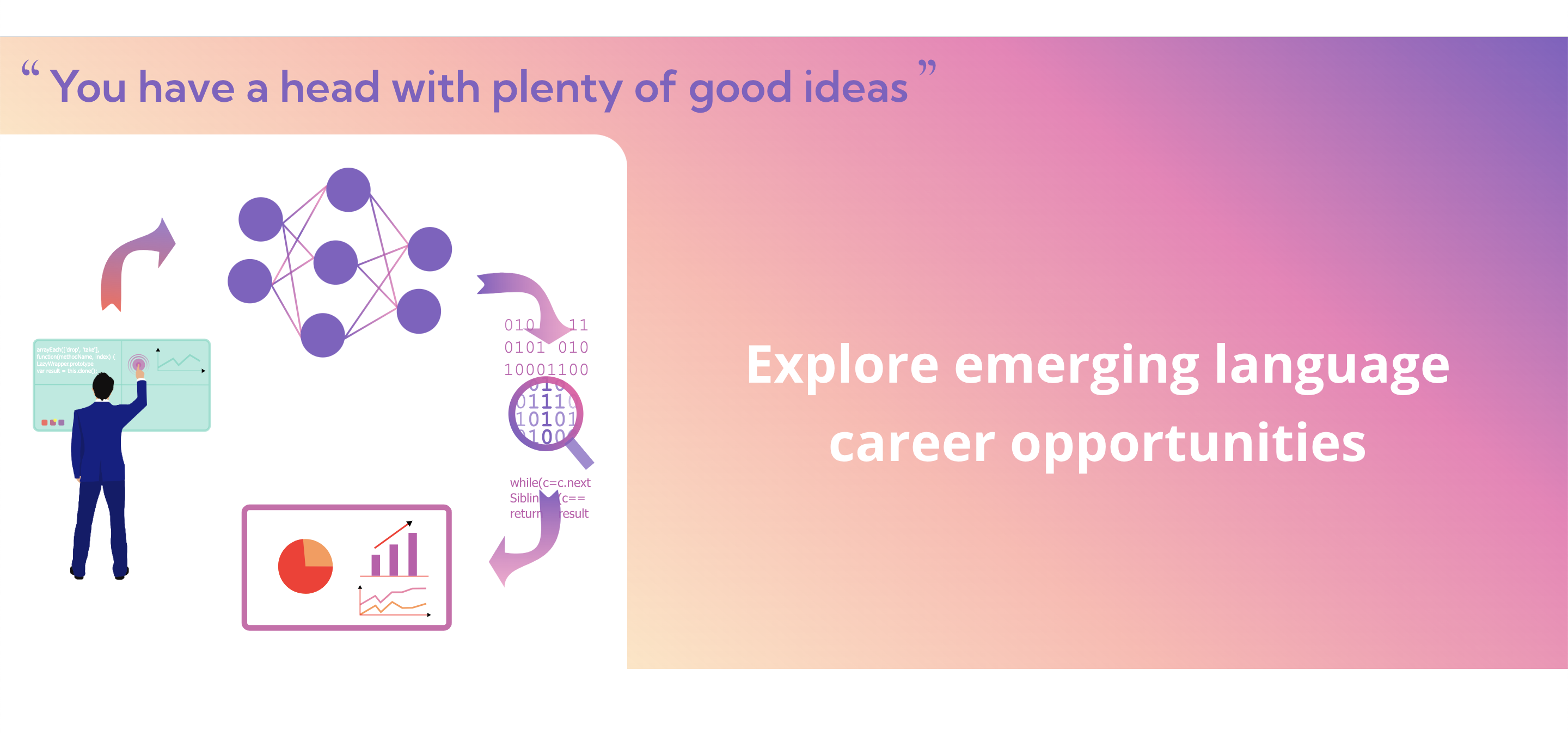
The UPSKILLS professional profile website
Active-based learning and UPSKILLS’ intellectual outputs
After a short coffee break, the event resumed with our second keynote lecture, this time by Sandro Caruana (University of Malta). In his talk, entitled Active-based Learning in Higher Education, he highlighted the themes of quality education and student agency, amongst others. Additionally, he addressed key concepts of active-based learning and the ways in which the UPSKILLS project is meeting these various criteria and best-practice approaches (watch here).
Following this insightful talk, the event’s focus was shifted to the project’s IOs once more by sketching out the results and deliverables of the 3 remaining IOs, that is, IO2, IO3 and IO4 respectively.
When we speak about pedagogical barriers, what has
IO2, which tackles the integration of research and research infrastructures into teaching, was presented by Marko Simonović (University of Graz) and Iulianna van der Lek (CLARIN ERIC). Marko introduced research-based teaching and provided an overview of the guidelines for integrating research into teaching (watch here), while Iulianna engaged with the ways of capitalising on research infrastructures in teaching on the example of CLARIN (watch here). The guidelines for integrating research into teaching, compiled as one of the project’s outcomes, are now available both in pdf format and on the webpage!
Jelena Gledić (University of Belgrade) then moved on to present IO3, that is, the set of dedicated curricula, which aggregate existing educational resources and new materials (watch here). She identified the learning blocks developed by UPSKILLS and the rationale behind the implementation and use of these blocks, while also discussing issues and experiences in the creation of this new learning content.
Lastly, Stavros Assimakopoulos presented IO4, the focus of this 4th multiplier event (watch here). Through this presentation, he brought out the importance of utilising games in the classroom and of enhancing teaching through games. He also presented results from the student game preference survey, carried out as part of the project, with a total of 215 respondents. Moreover, he outlined the various off-the-shelf and custom-made UPSKILLS games, focusing in particular on The Maze Game. This presentation concluded with an account regarding the general approach to gamification of all of the project’s learning content.
Prior to proceeding to the lunch break, a Q&A session was held, during which the participants and presenters engaged in a fruitful and insightful discussion regarding the various outcomes of the project, active-based learning, games and gamification.
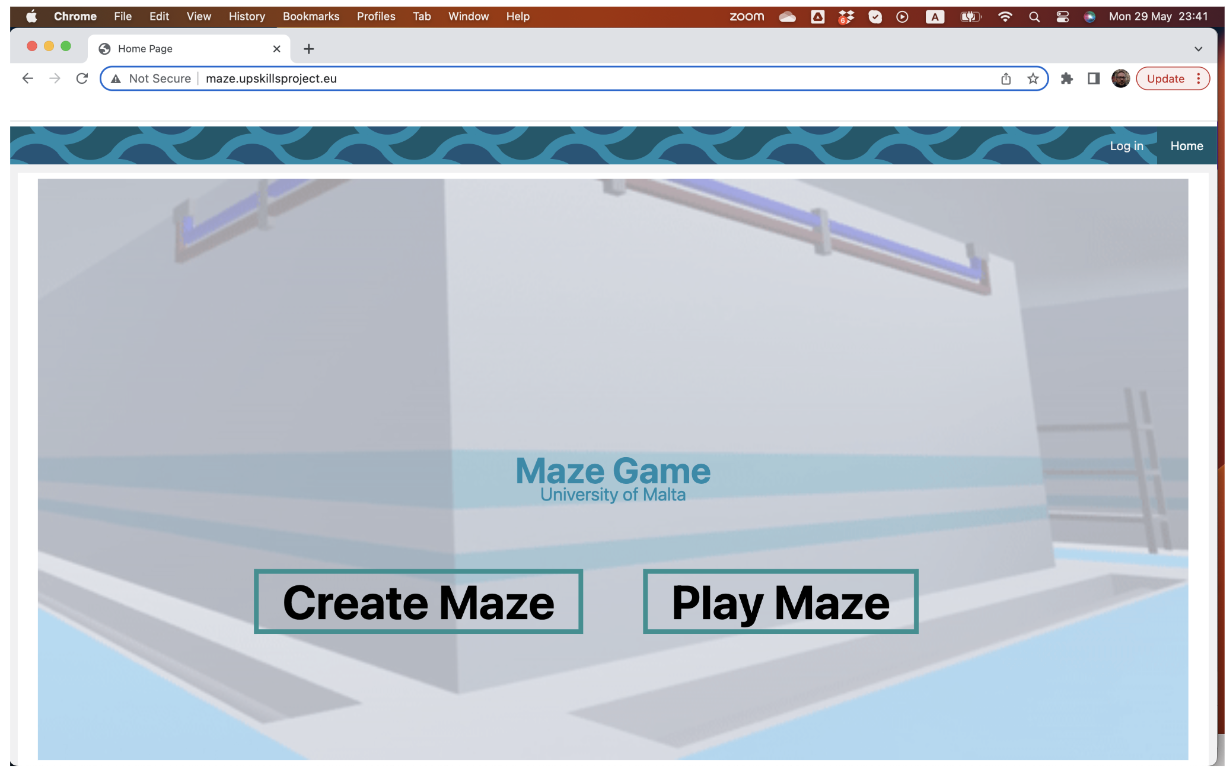
The UPSKILLS maze game
Teach through games – the way to go
The afternoon session was opened by Vanessa Camilleri (University of Malta) who presented guidelines and various best-practices in relation to game-based learning, such as defining one’s audience and identifying the skillset (watch here). She took on a very practical approach and showcased a number of games and gamification methods so as to highlight the benefits of game-based learning.
Presentation slides
- Guidelines and best practices for game-based learning
- “Guess the language” – Using a game for theory-based learning
- “TopLang” – Integrating learning and assessment in a gamified work simulation experience
Guess the Language, an enticing UPSKILLS game developed and implemented at the University of Geneva by Margherita Pallottino and Genoveva Puskas, together with their linguistics students, was then introduced. Genoveva described the way this game has been implemented as part of a learning block which focuses on theory-based learning (watch here). In this presentation, she identified numerous ways in which theoretical linguistics presents fruitful ground for the development of problem-solving and other abstract transferable skills, but also for the more concrete ones such as annotation or database development, as well as for the implementation of various didactic techniques such as gamification, as is the case with Guess the Language. The talk was followed by a short yet enriching discussion which extended into the coffee break.
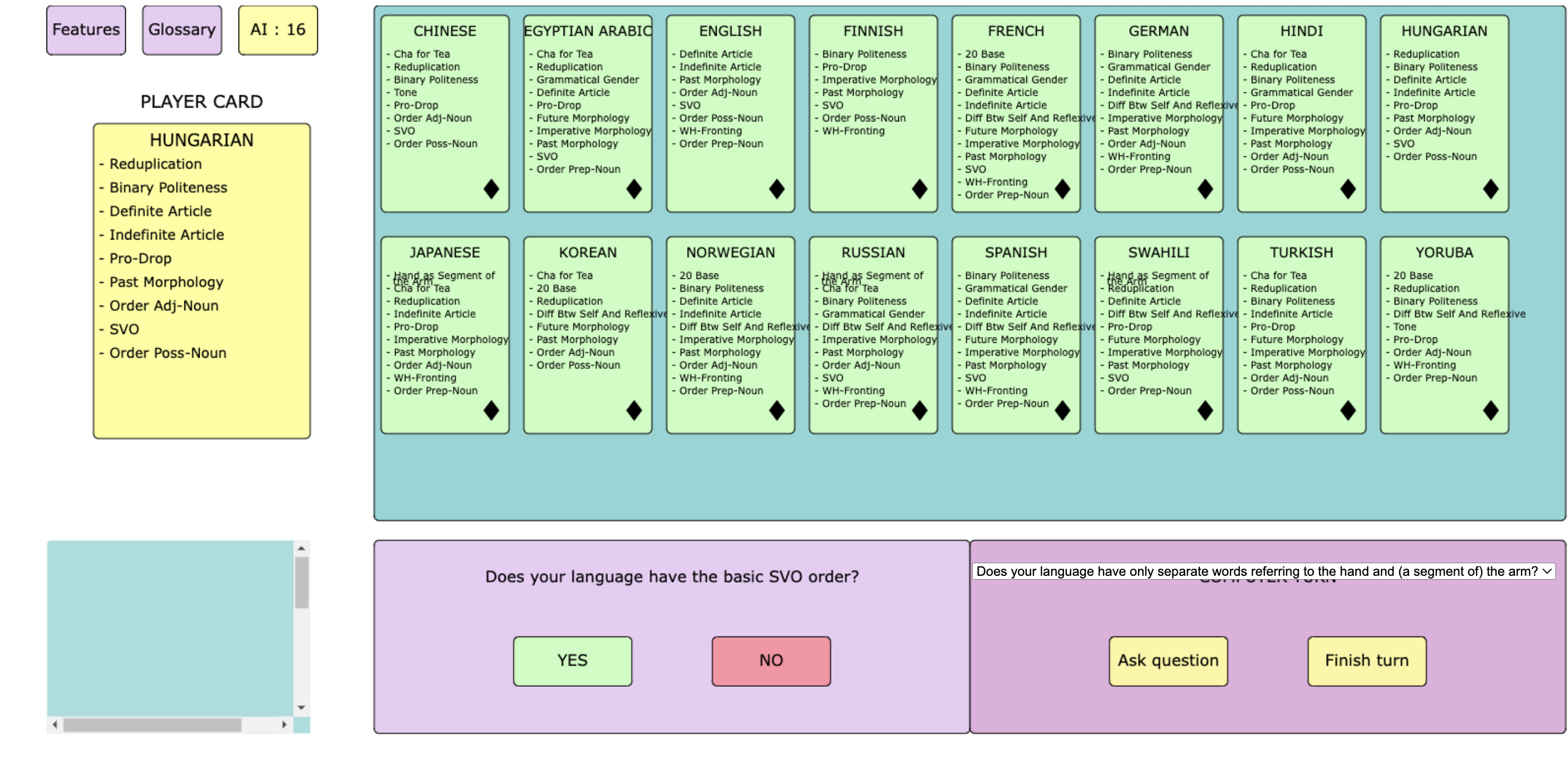
Guess the language!
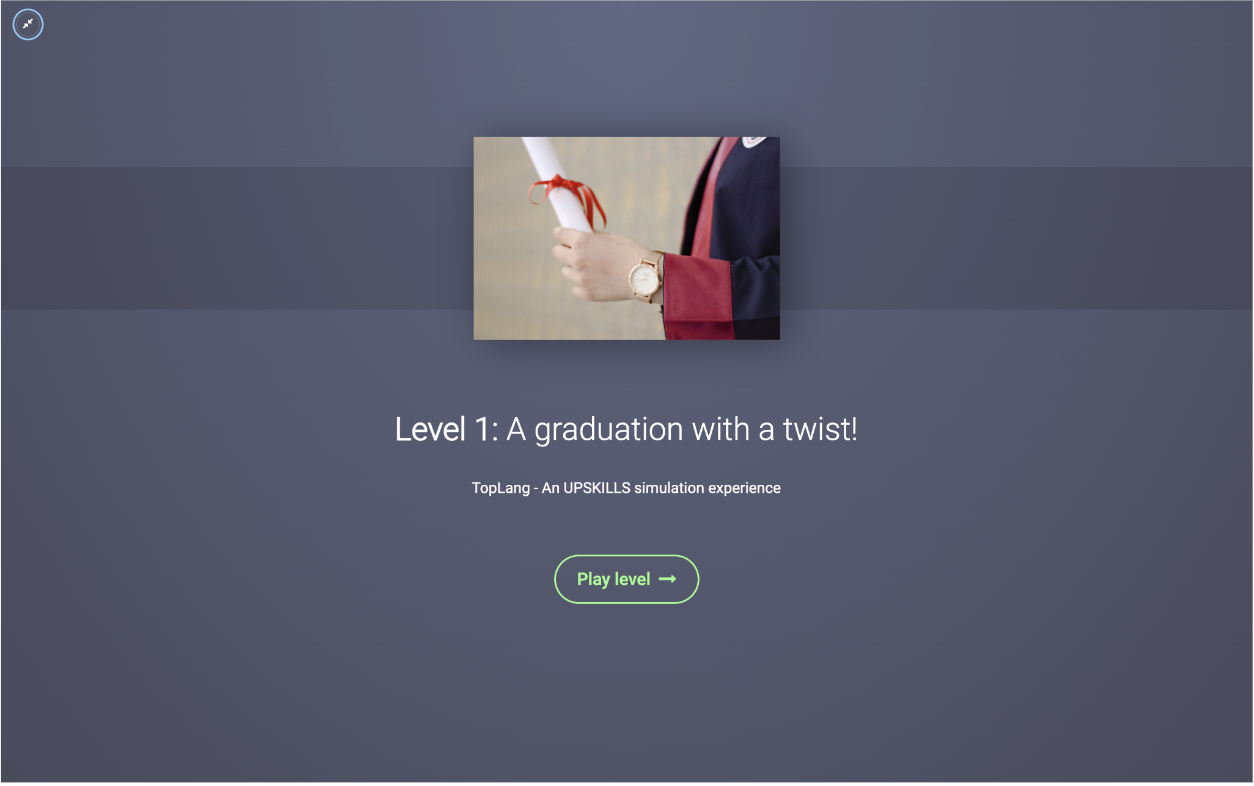
TopLang!
For the last presentation of the day, Stavros Assimakopoulos focused on TopLang; an UPSKILLS simulation experience which can be used for both learning and assessment (watch here). He tackled the rationale behind using this simulation experience in order to enhance learning and strengthen the link between academia and the industry in tertiary education linguistics and language-related courses. He discussed the scenario progression of this immersive mode of gamified learning and assessment while also briefly addressing the ways in which educators can tweak TopLang to create their own adapted version of the game which suits their classroom needs. A manual that guides educators through the process of adapting the game is also currently in progress, so stay tuned!
The event was rounded off with a final engaging discussion mainly revolving around TopLang and remaining future prospects of the project which is now nearing its completion.
Posted by Michela Vella (UM team)
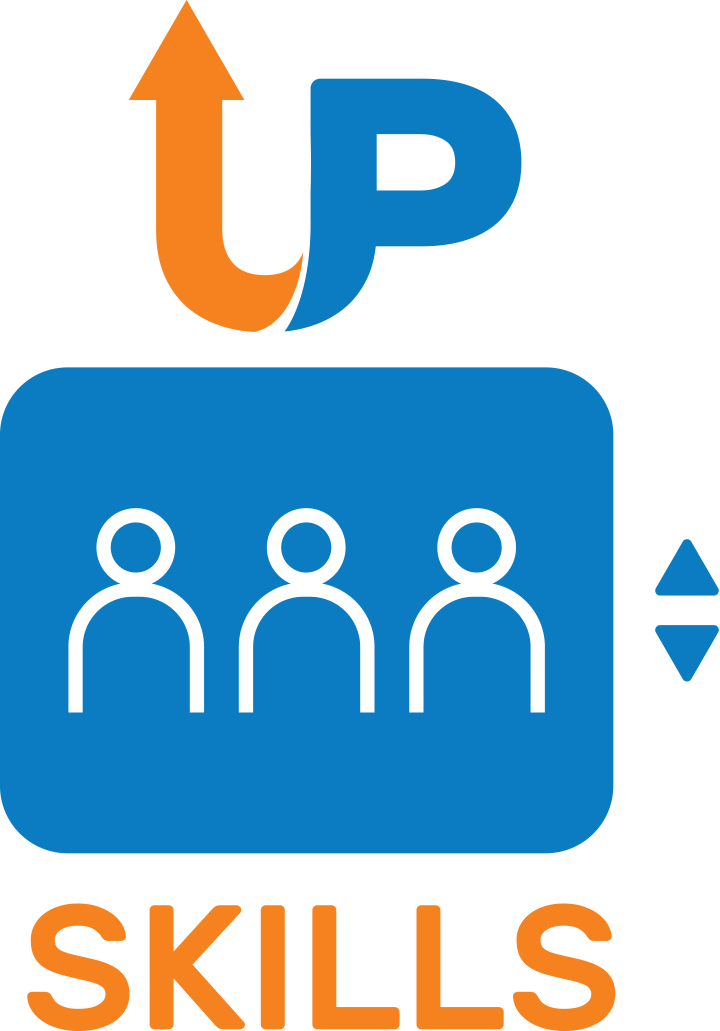
Recent Comments